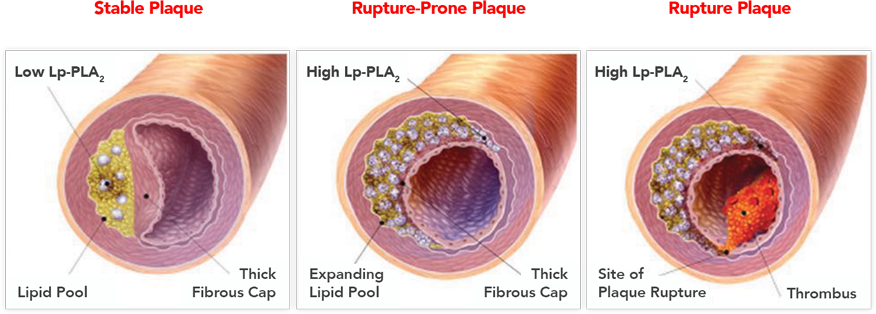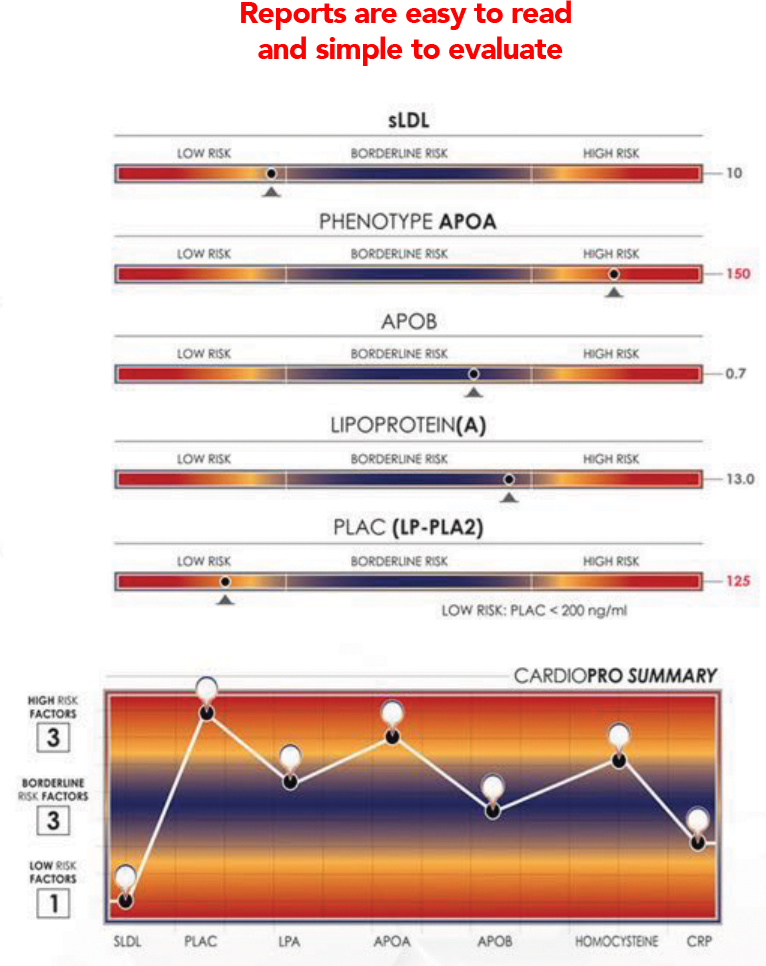
What is being tested in our heart health panels?
Click here to view a Sample Report related to this panel.
- Triglycerides
- Total Cholesterol
- HDL Cholesterol
- LDL Cholesterol
- Cholesterol/HDL Ratio
- sd LDL
- CRP, hs
- Homocysteine
- Lipoprotein (a)
- Apo Lipoprotein A-1
- Apo Lipoprotein B
- Insulin
Click here to view a Sample Report related to this panel.
- Triglycerides
- Total Cholesterol
- HDL Cholesterol
- LDL Cholesterol
- Cholesterol/HDL Ratio
- sd LDL
- CRP, hs
- Homocysteine
- Lipoprotein (a)
- Apo Lipoprotein A-1
- Apo Lipoprotein B
- Insulin
- Lp-PLA2 (PLAC TEST)
- Vitamin D, 25-OH
Click here to view a Sample Report related to this panel.
- Lipoprotein Fractionation
- Triglycerides
- Total Cholesterol
- HDL Cholesterol
- LDL Cholesterol
- Cholesterol/HDL Ratio
- sd LDL
- CRP, hs
- Homocysteine
- Lipoprotein (a)
- Apo Lipoprotein A-1
- Apo Lipoprotein B
- Insulin
- Lp-PLA2 (PLAC TEST)
- Vitamin D, 25 - OH Total
- CMP
- CBC w/ Diff
- Thyroid Panel(Ft3, Ft4, TSH)
- Reverse t3
- Testosterone Free & Total
- Sex Hormone Binding Globulin
- Vitamin B12
What are cardiac markers?
Cardiac markers are diagnostic tests used to provide insight on a patients overall heart health. By evaluating biomarkers in the blood, including lipids, proteins, and hormones, cardiac markers assess cardiovascular risk: the likelihood of developing cardiovascular disease. Cardiovascular disease is an umbrella term for all diseases that affect the heart or blood vessels, including coronary heart disease, which can lead to heart attacks, heart failure, and strokes.
What is measured with cardiac markers?
Cardiac markers measure different biomarkers that contribute to cardiovascular health. These include:
Lipoproteins
Lipoprotein (a), a type of LDL, apolipoprotein A1, the primary protein component of HDL, and apolipoprotein B, the primary protein component of LDL, are three central proteins to cardiovascular health. At irregular levels, these proteins can increase the risk of heart disease and stroke.
High-sensitivity C-reactive protein (hs CRP) is another protein to monitor carefully. The liver produces CRP as a response to injury or infection, but high levels of CRP indicate inflammation, which plays a role in the formation of plaque. Plaque contributes to the development of coronary artery disease by causing damage to the heart’s major blood vessels. Early symptoms of coronary artery disease include chest pain and shortness of breath, but, ultimately, it can lead to severe health problems, such as aggressive arrhythmia, an irregular heart rhythm, or heart attacks.
Endocrine and Metabolic
Our advanced cardiac markers also measure certain hormones. The interaction between different systems in the body is complex, and the endocrine, metabolic, and cardiovascular systems are no exception. For example, high levels of testosterone can negatively affect cardiac risk factors by raising blood pressure. Metabolism also directly influences heart health; diabetes and other conditions increase the likelihood of heart failure. The CardioPro Advanced Plus Panel, one of Access Medical Lab’s cardiac health panels, measures sd LDL, CRP, Homocysteine, Apo Lipoprotein A-1, Apo Lipoprotein B, Lp-PLA2 among many other cardiac and hormone markers. It also includes a thyroid panel and a comprehensive metabolic panel (CMP) for a thorough examination of hormonal, metabolic, and cardiovascular health.
What is Small, Dense LDL?
Having high LDL cholesterol, otherwise known as "bad" cholesterol, is not good for your heart health. However, more studies are now finding that it isn't only the quantity of LDL circulating in your blood-it's the quality, too. The type of LDL in your body may influence your risk of having heart disease down the road. Small, dense LDL is a type of LDL cholesterol that is considered to be an emerging risk factor for cardiovascular dis-ease. It is smaller and heavier than typical LDL cholesterol and can increase your risk of developing atherosclerosis. It is thought that small, dense LDL contributes to atherosclerosis because it is small enough to penetrate the walls of arteries, is more susceptible to being oxidized, and stays in the bloodstream longer.

- Lp-PLA-2: The PLAC Test is the only blood test cleared by the FDA to aid in assessing the risk for both CAD and stroke.
- Lipoprotein (a): A lipoprotein subclass, highlevels in the blood is a risk for CAD and stroke.
- APO A-1: APO-A-1 is a major protein component of HDL. This protein helps cholesterol efflux from liver excretion. APO A-1 plays a specific role in Lipid Metabolism.
- APO -B: The primary apolipoprotein of LDL which is responsible for carrying cholesterol to the tissues. High levels of APO-B can lead to Plaque in the arteries.
- BNP: Brain natriuretic peptide (BNP) test is a blood test that measures levels of a protein called BPN that is made by your heart and blood vessels. BP levels are higher than normal when you have heart failure.
- HOMOCYSTEINE: Homocysteine is an amino acid in the blood, high levels relate to a higher risk of CAD, stroke, and PVD.
- HS-CRP: Elevated amounts of hs-CRP is a response of inflammation in your body and inflammation in the blood vessels.
- VITAMIN D, 25-OH TOTAL: Vitamin D is a fat-soluble secosteroid. 80% of Americans are deficient in Vitamin D, putting them at risk for osteoporosis, cardiovascular disease, cancer and more.
- INSULIN: Insulin is a hormone that plays a central role in regulating carbohydrates and fats in the metabolism.

Explore our testing options for the full list of biomarkers measured in our cardiac blood panels. Each of our profiles can be customized to fit your patient’s needs.
The CardioPro Basic Panel examines cholesterol ratios, lipid levels, and cardiovascular markers associated with the risk of CVD.
The CardioPro Advanced Panel measures additional biomarkers related to heart conditions such as cardiovascular disease or coronary artery disease.
The CardioPro Advanced Plus Panel, our most comprehensive cardiac panel, provides a closer look at your endocrine, metabolic, and cardiovascular systems.
Ultimately, as a healthcare provider, you are best equipped to decide which blood panel will provide you with the information that you need.
What is the testing process?
All blood samples must be collected at a doctor’s office, clinic, or hospital. Once your sample is received in our laboratory, our team of highly-trained lab technologists will analyze the sample and send the results to you and/or your healthcare provider within 24 hours.
